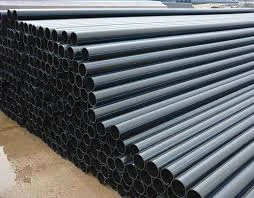Ноя . 17, 2024 14:57 Back to list
hdpe water pipe
Understanding HDPE Water Pipe A Sustainable Solution for Modern Infrastructure
High-Density Polyethylene (HDPE) water pipes have emerged as an essential component in the realm of modern infrastructure, particularly for water distribution systems. By examining the properties, advantages, and applications of HDPE water pipes, we can appreciate their significant role in promoting sustainability and efficiency in water management.
What is HDPE?
High-Density Polyethylene is a thermoplastic polymer made from petroleum. This versatile material is known for its high strength-to-density ratio, making it ideal for various applications, including construction, packaging, and water management systems. HDPE is distinguished by its resistance to impact, chemicals, and environmental stress, which makes it a popular choice for pipes that transport liquids, especially water.
Advantages of HDPE Water Pipes
1. Durability
One of the most significant advantages of HDPE water pipes is their remarkable durability. They can withstand extreme weather conditions, avoiding brittleness even at low temperatures. HDPE pipes are also resistant to corrosion and abrasion, which ensures a longer service life compared to traditional materials like metal or concrete.
2. Lightweight and Flexible
HDPE pipes are considerably lighter than PVC or metal pipes, which makes them easier to transport and install. Their flexibility allows them to be bent or curved to accommodate various installation environments, reducing the need for additional fittings and connectors.
3. Cost-Effectiveness
Although the initial cost of HDPE pipes can be higher than that of some traditional pipe materials, the overall life cycle cost can be significantly lower. Their durability reduces the need for frequent replacements and repairs, while their lightweight nature contributes to lower transportation and installation costs.
4. Chemical Resistance
HDPE pipes are highly resistant to a wide range of chemicals and corrosive substances, which is crucial for water distribution systems. This resistance minimizes the risk of contamination, ensuring that the water supply remains safe and clean for households and industries.
5. Environmentally Friendly
hdpe water pipe

HDPE is a recyclable material, contributing to sustainable practices in the construction and water management sectors. The production process of HDPE emits fewer greenhouse gases compared to traditional materials, and since it can be recycled, it helps reduce waste in landfills.
Applications of HDPE Water Pipes
HDPE water pipes are used in various applications, ranging from municipal water supply to agricultural irrigation. Here are some common uses
1. Municipal Water Supply
Cities and towns around the world are increasingly adopting HDPE pipes for their potable water systems. These pipes can be installed underground, ensuring a clean and safe water supply while minimizing the risk of contamination.
2. Wastewater Management
HDPE pipes are also used in wastewater management systems. Their resistance to chemicals and corrosion makes them an ideal choice for transporting sewage and other waste materials without degrading or leaking.
3. Industrial Applications
Industries often use HDPE pipes for transporting various liquids, including chemicals, oils, and other materials. Their durability and chemical resistance ensure safe and reliable transportation.
4. Agricultural Irrigation
Farmers utilize HDPE pipes in irrigation systems due to their flexibility and resistance to environmental factors. They can efficiently transport water over long distances, supporting healthy crop growth while conserving water.
Conclusion
HDPE water pipes represent a significant advancement in the field of water management. With their durability, cost-effectiveness, and environmental benefits, they offer a robust solution for both municipal and industrial applications. As communities worldwide face increasing challenges related to water supply and sustainability, the adoption of HDPE pipe technology promises to play a vital role in addressing these issues. The future of infrastructure relies on innovative materials like HDPE to ensure efficient and sustainable water management practices. Embracing this technology is not just a matter of convenience, but a critical step towards a sustainable future for generations to come.
-
PVC Grey Sheet for Extraction: Chemical Resistant & Durable
NewsAug.19,2025
-
Durable PVC Pipe Fittings for Plumbing & Irrigation Needs
NewsAug.18,2025
-
HDPE Steel Belt Reinforced Spiral Corrugated Pipe | High Strength
NewsAug.17,2025
-
HDPE Pipe Fittings: Durable, Leak-Proof Solutions
NewsAug.16,2025
-
Premium CPVC Sheet: High-Temp & Chemical Resistant Solutions
NewsAug.15,2025
-
Durable PPR Pipe for Hot & Cold Water Systems - Easy Install
NewsAug.14,2025

